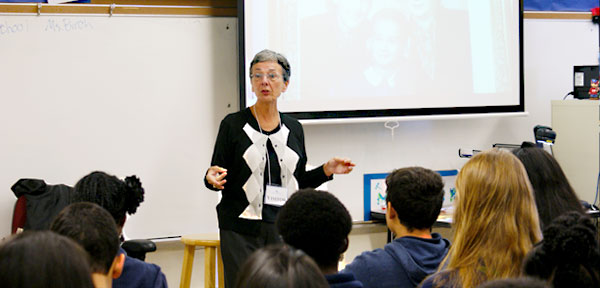
Guest speaker and daughter of concentration camps survivors, Mrs. Lilliane Birch, shares a story of hope,
perseverance, and fortitude with Paul Cuffee 8th graders.
The students in Tom Chen’s 8th grade humanities class have been studying the Holocaust for the past six weeks and responding to the essential question “How do individuals and groups make choices that affect their lives, their community, and the world?”
In reflecting on the plight of six million Jews during WW II, students found the inspirational stories of those who chose to never give up hope and those who, in an uncanny twist of fate, saved lives by assigning families to the “work line” at a concentration camp vs. the alternative.
Lilliane Birch, a speaker from the Holocaust Center of Rhode Island, told the poignant story of her mother, Anka, a Holocaust survivor. Students learned of Anka’s experiences as a high school student in Poland in 1939, later as a prisoner of a concentration camp, and finally as a new immigrant to America.
As a young woman, Anka was given up to the Nazis by someone who knew her and faced a new life — Auschwitz. She had been put in the death line and was saved by what could only be called a miraculous coincidence; an old friend of hers from high school was working at the camp. The friend remembered Anka being one of the few people who were nice to her and pulled her from the death line.
It took many years for Anka to tell her daughter about the atrocities she had lived through and today Lilliane works to make sure that her mother’s story and those like it are not forgotten. She ended by saying that justice can only happen when we stand up for others no matter what they look like, what their beliefs are, or where they come from. So, Mrs. Birch’s answer to the class’ essential question was “Justice comes from ordinary people who will stand up to the evils of this world.”

(Left) Paul Cuffee 8th graders Mahogany Braxton, Yamil Rivas, and Emily Cabreja thank Mrs. Birch
for inspiring them with her story. (Right) Paul Cuffee 8th graders, Xavier Rodriguez, Andre de los Santos,
and Sean Duke consider Mrs. Birch’s story of survival as an answer to the essential question: “How do individuals and groups make choices that affect their lives, their community and the world?”


